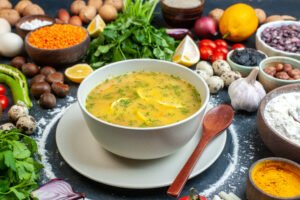Ever experienced a sudden pang in your stomach that just won’t go away?
You’re not alone.
Many people grapple with stomach discomfort, often mistaking it for minor indigestion or temporary discomfort.
However, these seemingly innocuous symptoms could be indicative of a deeper issue – gastritis.

Gastritis often presents symptoms that overlap with other common digestive ailments, leading to delayed diagnosis and treatment. This delay can exacerbate the condition, leading to more severe complications.
What’s particularly challenging is that gastritis doesn’t discriminate based on age.
While adults may experience typical symptoms like abdominal pain, nausea, and bloating, the manifestations can differ across different age groups.
In children and the elderly, symptoms may vary, making diagnosis trickier.
Many turn to natural remedies or DIY treatments in hopes of finding relief from gastritis symptoms. However, amidst the plethora of information available online, it’s essential to separate fact from fiction.
Myths surrounding the effectiveness of home remedies can sometimes hinder proper medical intervention, prolonging discomfort and increasing the risk of complications.
In recent years, there’s been a growing interest in gastritis supplements as adjunct or complementary treatments to conventional therapies.
However, it’s crucial to approach these with caution and consult gastritis experts before incorporating them into your regimen. While supplements may offer some relief, they’re not a substitute for professional medical advice and treatment.
In this article, we’ll delve deeper into the signs, symptoms, and treatment options for gastritis, shedding light on effective management strategies and the importance of seeking professional guidance.
So, What Exactly Is Gastritis, And How Does It Relate To Other Common Digestive Ailments Sharing Similar Symptoms?
Gastritis is an inflammation of the stomach lining, which can be caused by various factors such as excessive alcohol consumption, prolonged use of nonsteroidal anti-inflammatory drugs (NSAIDs), bacterial infections (such as H. pylori), stress, or autoimmune diseases.
While gastritis can cause significant discomfort and inconvenience, there are several other conditions that share similar symptoms (which can sometimes lead to confusion and misdiagnosis.) and can potentially be more dangerous if left untreated.
Here are the top 10 conditions similar to gastritis to be aware of:
- Peptic Ulcers
Like gastritis, peptic ulcers involve inflammation of the stomach lining, but they are open sores that can lead to bleeding or perforation if not managed properly.
- Gastroesophageal Reflux Disease (GERD)
Chronic acid reflux can damage the esophagus over time, increasing the risk of esophageal ulcers or Barrett’s esophagus, a precancerous condition.
- Stomach Cancer
Symptoms of stomach cancer, such as abdominal pain, nausea, and weight loss, can mimic those of gastritis. However, stomach cancer can be life-threatening if not diagnosed and treated early.
- Pancreatitis
Inflammation of the pancreas can cause severe abdominal pain, nausea, and vomiting, similar to gastritis. Acute pancreatitis requires prompt medical attention to prevent complications.
- Gallstones
Gallstones can cause inflammation of the gallbladder (cholecystitis) or blockage of the bile duct, leading to symptoms like abdominal pain, nausea, and vomiting.
- Diverticulitis
Inflammation or infection of small pouches in the colon (diverticula) can cause symptoms resembling gastritis, such as abdominal pain, bloating, and changes in bowel habits.
- Celiac Disease
Gluten intolerance can damage the lining of the small intestine, resulting in abdominal pain, bloating, diarrhea, and malabsorption of nutrients.
- H. pylori Infection
While H. pylori bacteria can cause gastritis, it can also lead to more serious conditions such as peptic ulcers or stomach cancer if left untreated.
- Inflammatory Bowel Disease (IBD)
Conditions like Crohn’s disease and ulcerative colitis involve chronic inflammation of the gastrointestinal tract, leading to symptoms like abdominal pain, diarrhea, and rectal bleeding.
- Functional Dyspepsia
This chronic disorder is characterized by recurring indigestion symptoms such as abdominal pain, bloating, and early satiety without an identifiable cause.
While less dangerous than some other conditions listed, it can still significantly impact quality of life if not properly managed.
How Do You Know It’s Gastritis? (Here Are Top 5 Signs To Look Out For)
Recognizing gastritis involves paying attention to specific signs and symptoms that commonly accompany inflammation of the stomach lining.
Here are the five (5) gastritis symptoms and signs to look out for:
- Persistent Abdominal Pain or Discomfort
Gastritis often manifests as persistent or recurrent pain or discomfort in the upper abdomen. This discomfort may range from a dull ache to a burning sensation and tends to worsen after meals or when the stomach is empty.

The pain may be localized or radiate to the chest, back, or lower abdomen. It’s important to note that the severity and frequency of pain can vary among individuals.
- Nausea and Vomiting
Individuals with gastritis frequently experience symptoms of nausea, which may be accompanied by episodes of vomiting.
These symptoms can occur intermittently throughout the day and may worsen after eating certain foods or beverages. In severe cases, persistent nausea and vomiting can lead to dehydration and electrolyte imbalances, requiring medical intervention.
- Bloating and Feeling of Fullness
Gastritis can cause abdominal bloating and a persistent sensation of fullness, even after consuming small amounts of food.
This bloating may be accompanied by excessive gas, belching, or flatulence. The sensation of fullness can interfere with normal eating patterns and contribute to a decreased appetite, potentially leading to unintended weight loss over time.
- Indigestion or Heartburn
Many individuals with gastritis experience symptoms of indigestion, such as heartburn or discomfort in the upper abdomen.
This discomfort may be exacerbated by consuming spicy, acidic, or fatty foods and can be accompanied by a sour taste in the mouth or regurgitation of stomach contents.
Persistent heartburn or indigestion should be evaluated by a healthcare professional to rule out more serious conditions such as gastroesophageal reflux disease (GERD) or peptic ulcers.
- Loss of Appetite and Weight Loss
Gastritis can lead to a decreased appetite or a feeling of early satiety, where individuals feel full shortly after beginning a meal.
This loss of appetite may result in inadequate calorie intake and unintentional weight loss over time.
While weight loss can be a symptom of various medical conditions, it’s essential to monitor changes in appetite and weight, especially when accompanied by other gastrointestinal symptoms characteristic of gastritis.
PS: It’s crucial to recognize that these signs and symptoms are not exclusive to gastritis and can overlap with other gastrointestinal disorders.
If you experience persistent or severe symptoms suggestive of gastritis, it’s important to seek medical evaluation and diagnosis from a healthcare professional.
Diagnostic tests such as blood tests, endoscopy, or imaging studies may be necessary to confirm the presence of gastritis and determine the underlying cause.
Early detection and appropriate management are essential for relieving symptoms and preventing complications associated with gastritis.
Here Are The Dangers of Delaying Gastritis Treatment:
- Worse Inflammation
The stomach lining will continue to be irritated, which can worsen inflammation and lead to more severe pain and discomfort.
- Increased Risk of Bleeding
Chronic inflammation can damage the stomach lining, making it more susceptible to bleeding ulcers.
- Scarring (Strictures)
In severe cases, long-term inflammation can cause scar tissue to form in the stomach, making it difficult for food to pass through (strictures).
- H. Pylori Complications
If H. pylori bacteria is the cause of gastritis and left untreated, it can increase your risk of stomach cancer.
- Nutritional Deficiencies
Chronic gastritis can interfere with nutrient absorption, leading to deficiencies in iron, vitamin B12, and other essential vitamins.
- Anxiety and Depression
Chronic stomach pain and discomfort can significantly impact your quality of life and contribute to anxiety and depression.

Early diagnosis and treatment of gastritis can help prevent these complications and promote faster healing. If you suspect you have gastritis, it’s important to see a doctor for proper diagnosis and treatment.
Before we discuss the link between gastritis and weightloss, let’s quickly touch on the affects of gastritis on quality of life and productivity.
How Does Gastritis Impact Quality of Life?
Gastritis can significantly impair quality of life and productivity due to the persistent symptoms and potential complications associated with the condition.
Here’s how gastritis can impact various aspects of daily life:
- Physical Discomfort
The symptoms of gastritis, such as abdominal pain, bloating, nausea, and indigestion, can cause persistent physical discomfort and distress.
This discomfort may interfere with activities of daily living, such as eating, sleeping, and engaging in physical exercise or work-related tasks.
Chronic pain and discomfort can also affect mobility and reduce overall physical well-being.
- Dietary Restrictions
Individuals with gastritis may need to adhere to dietary restrictions to avoid triggering symptoms and aggravating inflammation of the stomach lining.
This may involve avoiding spicy, acidic, fatty, or fried foods, as well as limiting alcohol and caffeine intake.
Adhering to dietary restrictions can be challenging and may require careful meal planning and preparation, potentially limiting food choices and enjoyment of meals.
- Impact on Mental Health
Chronic gastritis can take a toll on mental health and emotional well-being. Persistent symptoms such as abdominal pain, nausea, and fatigue can lead to feelings of frustration, anxiety, and depression.
Coping with ongoing discomfort and uncertainty about symptom management may contribute to stress and negatively impact overall mental health and quality of life.
- Social Limitations
Gastritis symptoms may restrict social activities and interactions, as individuals may feel uncomfortable or self-conscious about experiencing symptoms in public settings.
Avoidance of social gatherings, dining out, or participating in recreational activities due to fear of symptom flare-ups can lead to social isolation and feelings of loneliness.

- Work and Productivity
Gastritis can impair work performance and productivity, particularly if symptoms interfere with concentration, focus, and energy levels.
Absences from work due to severe symptoms or medical appointments may disrupt workflow and strain professional relationships.
Chronic fatigue and discomfort associated with gastritis can also affect productivity and job satisfaction, leading to decreased efficiency and job performance.
- Financial Burden
Managing gastritis may entail various healthcare expenses, including doctor’s visits, diagnostic tests, prescription medications, and potential hospitalizations or surgical interventions for complications.
Additionally, dietary modifications and lifestyle changes may incur additional costs, such as purchasing specialized foods or supplements.
The financial burden of managing gastritis can further exacerbate stress and impact overall quality of life.
Top 7 Benefits of Using Gastritis Supplements
Gastritis supplements, when used as adjunct or complementary treatments alongside conventional therapies, may offer several potential benefits in managing gastritis symptoms and promoting stomach health.
Here are seven potential benefits of using gastritis supplements:
- Reduced Gastric Inflammation
Some gastritis supplements contain natural anti-inflammatory ingredients such as turmeric, ginger, or licorice root, which may help reduce inflammation in the stomach lining.
By targeting inflammation, these supplements can alleviate symptoms such as abdominal pain and discomfort associated with gastritis.
- Enhanced Digestive Function
Certain supplements contain digestive enzymes, probiotics, or herbal extracts that can support digestive function and improve nutrient absorption.
By promoting healthy digestion, these supplements may help alleviate symptoms such as bloating, indigestion, and discomfort after eating.
- Protection Against Gastric Mucosal Damage
Gastritis supplements containing mucosal protective agents such as slippery elm bark or deglycyrrhizinated licorice (DGL) may help strengthen the protective lining of the stomach and prevent mucosal damage caused by factors such as stomach acid, NSAIDs, or bacterial infections.
- Relief of Gastric Discomfort
Herbal supplements such as chamomile, peppermint, or marshmallow root have been traditionally used to soothe gastric discomfort and relieve symptoms such as heartburn, nausea, and bloating.
These supplements may provide symptomatic relief for individuals with gastritis.
- Support for H. pylori Eradication
Supplements containing natural antimicrobial agents such as berberine, garlic extract, or mastic gum may help support the eradication of Helicobacter pylori (H. pylori) bacteria, which is associated with the development of gastritis and peptic ulcers.
Combining these supplements with conventional antibiotic therapy may enhance treatment efficacy.
- Stress Reduction and Mood Support
Some gastritis supplements contain adaptogenic herbs such as ashwagandha, rhodiola, or holy basil, which can help reduce stress levels and support overall emotional well-being.
Chronic stress can exacerbate gastritis symptoms, so supplementing with adaptogens may have indirect benefits for stomach health.
- Improved Nutritional Status
Certain gastritis supplements contain vitamins, minerals, or antioxidants that are essential for maintaining optimal health and supporting immune function.
By replenishing nutrient deficiencies and promoting overall nutritional status, these supplements can help support recovery from gastritis and reduce the risk of complications.
It’s important to note that while gastritis supplements may offer potential benefits, they should not replace conventional medical treatment or lifestyle modifications recommended by healthcare professionals.
Before starting any supplementation regimen, it’s advisable to consult with a healthcare provider to ensure safety and efficacy, especially if you have underlying health conditions or are taking medications that may interact with supplements.
Additionally, choosing high-quality supplements from reputable manufacturers and following recommended dosages is essential for maximizing potential benefits and minimizing risks.
Choosing The Best Supplements – 4 Factors To Consider
When choosing the best supplements for gastritis, it’s important to consider several factors to ensure safety, efficacy, and compatibility with your individual needs.
Here are four key factors to consider:
- Quality and Purity
Opt for supplements from reputable manufacturers that adhere to strict quality control standards and third-party testing protocols.
Look for certifications such as Good Manufacturing Practices (GMP), NSF International, or United States Pharmacopeia (USP) to ensure that the supplements are free from contaminants, impurities, and adulterants.
- Ingredients and Formulation
Review the list of ingredients and formulation of the supplement to ensure that it contains evidence-based ingredients known to support gastric health and alleviate symptoms of gastritis.
Look for supplements that contain natural anti-inflammatory agents, mucosal protectants, digestive enzymes, probiotics, and other beneficial compounds.
- Dosage and Potency
Consider the dosage and potency of the supplement to ensure that it provides adequate therapeutic benefits without exceeding recommended daily allowances or posing risks of toxicity.
Pay attention to standardized extracts, bioavailability-enhancing ingredients, and optimal dosages supported by clinical research.
- Safety and Potential Interactions
Consult with a healthcare professional before starting any supplementation regimen, especially if you have underlying health conditions, are pregnant or breastfeeding, or are taking medications that may interact with supplements.
Certain ingredients in gastritis supplements may interact with medications or exacerbate underlying health conditions, so it’s essential to discuss potential risks and benefits with a qualified healthcare provider.
By considering these factors and consulting with a healthcare professional, you can make informed decisions when choosing the best supplements for managing gastritis and promoting stomach health.
Additionally, incorporating lifestyle modifications such as adopting a balanced diet, managing stress, avoiding trigger foods, and practicing good hygiene can complement supplementation efforts and contribute to overall well-being.
Speaking Of Gastritis Trigger Foods, What Are They?
Gastritis trigger foods are those that can exacerbate inflammation of the stomach lining and worsen symptoms associated with gastritis.
While trigger foods can vary among individuals based on personal sensitivities and underlying health conditions, there are several common culprits that are known to irritate the stomach and contribute to gastritis symptoms.
Here are some common gastritis trigger foods to be mindful of:
- Spicy Foods
Spicy foods, such as chili peppers, hot sauces, and curry dishes, contain capsaicin, a compound that can irritate the stomach lining and increase stomach acid production.
Consuming spicy foods can exacerbate symptoms of gastritis, including abdominal pain, heartburn, and indigestion.
- Acidic Foods and Beverages
Acidic foods and beverages, including citrus fruits (e.g., oranges, lemons, grapefruits), tomatoes, vinegar, and carbonated drinks, can irritate the stomach lining and trigger acid reflux symptoms.
Limiting intake of acidic foods and beverages can help reduce gastric irritation and alleviate symptoms of gastritis.
- Fatty and Fried Foods
High-fat and fried foods, such as greasy fast food, fried chicken, French fries, and fatty cuts of meat, can delay stomach emptying and increase the production of stomach acid, leading to discomfort and exacerbation of gastritis symptoms.
Choosing leaner protein sources and opting for cooking methods such as baking, grilling, or steaming can help minimize gastric irritation.
- Processed and Spicy Condiments
Processed condiments and spicy sauces, such as ketchup, mustard, mayonnaise, and barbecue sauce, often contain additives, preservatives, and spices that can irritate the stomach lining and trigger inflammation.
Opt for homemade or low-sodium alternatives whenever possible to reduce gastric irritation.
- Alcohol
Alcohol consumption can irritate the stomach lining, increase stomach acid production, and weaken the protective barrier of the stomach, making it more susceptible to inflammation and damage.
Limiting or avoiding alcohol consumption can help alleviate symptoms of gastritis and promote stomach health.
- Caffeine
Caffeinated beverages, such as coffee, tea, energy drinks, and certain soft drinks, can stimulate gastric acid secretion and exacerbate symptoms of gastritis, including heartburn, indigestion, and abdominal discomfort.
Choosing decaffeinated alternatives or herbal teas can help minimize gastric irritation.
- Spicy and Processed Snacks
Spicy and processed snacks, such as chips, pretzels, crackers, and packaged snack foods, often contain additives, spices, and artificial flavorings that can irritate the stomach lining and exacerbate symptoms of gastritis.
Opt for whole, minimally processed snacks such as fresh fruit, vegetables, nuts, and seeds to reduce gastric irritation.
It’s important to note that individual sensitivities to trigger foods can vary, so it may be helpful to keep a food diary and track your dietary intake to identify specific foods that worsen your gastritis symptoms.
Additionally, working with a healthcare professional or registered dietitian can help develop a personalized dietary plan tailored to your needs and preferences to manage gastritis effectively.
We Are Rounding Off
Understanding the root cause of abdominal discomfort is essential for effective management and relief.
Whether it’s gastritis, indigestion, or another underlying issue, recognizing the symptoms and seeking timely medical advice is paramount.
By differentiating between these conditions and adopting appropriate treatment strategies, individuals can alleviate discomfort, improve quality of life, and safeguard their stomach health.
Remember, proper diagnosis and personalized care are key to navigating the complexities of gastrointestinal health.
So, if you’re experiencing persistent stomach pain or discomfort, don’t hesitate to consult a healthcare professional for guidance and support.
Your stomach will thank you for it!












